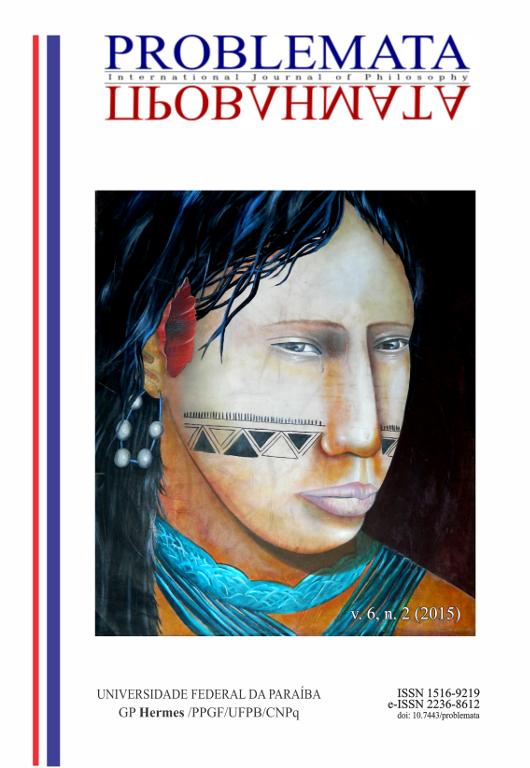A CRÍTICA METODOLÓGICA DAS CIÊNCIAS DE WILHELM WINDELBAND
DOI:
https://doi.org/10.7443/25096Keywords:
metodologia científica, teoria das categorias, ciências nomológicas, idiográficas e axiomáticas.Abstract
Neste artigo procuro expor o projeto filosófico de Wilhelm Windelband de crítica metodológica das ciências. Diante da crise da filosofia acadêmica no final do século XIX em face das revoluções científica e tecnológicas, Windelband propõe que a filosofia deixe de disputar com as ciências a hegemonia pela produção do conhecimento e se dedique a um trabalho de crítica dos métodos científicos. Método entendido não como técnica de pesquisa, mas como investigação das condições de possibilidade de todo conhecimento científico. Trata-se de um projeto de coordenação da filosofia com as ciências particulares, pelo qual a filosofia deve problematizar aquilo que é tomado acriticamente como ponto de partida pelas ciências: os “fatos”, no caso das ciências empíricas, e os “axiomas”, no caso das ciências formais. Dessa análise se desenvolve um novo modo de classificação das ciências fundado na tipologia do método, que resultará na famosa distinção entre ciências nomotéticas e idiográficas, além de considerações sobre o método das ciências axiomáticas. Acessoriamente também apresento um esboço da teoria das categorias de Windelband, que está na base desse projeto de crítica metodológica das ciências.
[doi:http://dx.doi.org/10.7443/problemata.v6i2.25096]
Downloads
References
BOLÉO, Luísa Viana de Paiva. D. Maria I: a rainha louca. Portugal: Esfera dos Livros, 2009.
RESENDE JR, José. Em busca de uma teoria do sentido: Windelband, Rickert, Husserl, Lask e Heidegger. São Paulo: Educ/Fapesp, 2013.
RICKERT, Heinrich. Kulturwissenschaft und Naturwissenschaft. Tübigen, 1899.
SOBER, Elliott. Philosophy of Biology. 2nd ed. Boulder: Westview Press, 2000.
WINDELBAND, Wilhelm. Geschichte und Naturwissenschaft. Rede zum Antritt des Rektorats der Keiser-Wilhelms-Universität Straßburg gehalten am 1. Mai 1894.
______. Vom System der Kategorien. Philosophische Abhandlungen Christoph Sigwart zu seinem siebzigsten Geburstage 28. März 1900. Tübingen, J. C. B Mohr (Paul Siebeck), 1900.
______. “Was ist Philosophie?”. In: Präludien. Aufsätze und Reden zur Einleitung in die Philosophie. 3. ed. Tübingen, J. C. B. Mohr (Paul Siebeck), 1907.
______. Die Principien der Logik. In: Encyclopädie der philosophischen Wissenschaften. hrsg. A. Ruge. Logik (vol. 1). Tübingen, J. C. B. Mohr (Paul Siebeck), 1913.
Downloads
Published
Issue
Section
License
Authors who publish with this journal agree to the following terms:
- Authors retain copyright and grant the journal right of first publication with the work simultaneously licensed under a Creative Commons Attribution License that allows others to share the work with an acknowledgement of the work's authorship and initial publication in this journal.
- Authors are able to enter into separate, additional contractual arrangements for the non-exclusive distribution of the journal's published version of the work (e.g., post it to an institutional repository or publish it in a book), with an acknowledgement of its initial publication in this journal.
-
- Authors are permitted and encouraged to post their work online (e.g., in institutional repositories or on their website) prior to and during the submission process, as it can lead to productive exchanges, as well as earlier and greater citation of published work (See The Effect of Open Access).





